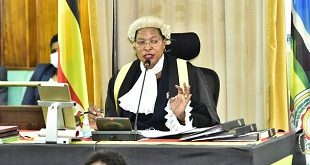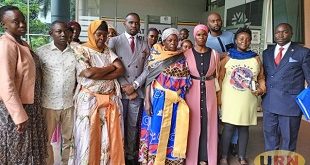How do you intend to promote trade between the two countries?
Germany is better known in Uganda than Uganda is in Germany. I would like to change that. We need more bilateral trade, and more German investment in Uganda. Whenever I go back to Germany, I try to meet with potential investors and raise their interest in doing business here. There is enormous potential in the agricultural sector. We already have an important international player here, Neumann Coffee. Their plantation in Kaweri on the road to Fort Portal is a major investment. It employs thousands of Ugandans. However, more could be done. The coffee beans are being exported unprocessed, and then blended and roasted in Germany. The established German coffee roasting companies in Hamburg and Bremen have been doing this for centuries. As a result, more money is being made out of coffee in Germany than in Uganda. If we want to be serious about development, we should start to rethink. More value could be added in Uganda to your high-quality coffee. I will try my best to explore new ways of coffee processing with the German roasters. I also believe that cotton spinning is possible in Uganda, enabling your country to build up a value adding chain from the cotton field to textile production. Why spin cotton in China when you can do it in Gulu?
President. @KagutaMuseveni receiving H.E Dr Albrecht Conze Ambassador of #Germany to Uganda. @GermanyDiplo @UgandaMFA) pic.twitter.com/oCF32Ol0zv
— State House Uganda (@StateHouseUg) November 7, 2017
You were already here during the recent debate in Parliament over the removal of an article on the presidential age limit from Uganda’s Constitution. What were some of your impressions of this debate?
This was the first Parliamentary debate of substance that I have witnessed as a foreign envoy on Ugandan soil. I was pleased by the lively and politically-minded spirit of controversy among your MPs. As in most other parliaments, the opposition is usually weaker than the ruling party but the debate was there. The debate was country wide. Religious leaders and other stakeholders of civil society took part in it. I wouldn’t want to comment on the issue itself as it was an internal constitutional matter. Parliament, as the people’s voice, has the last word on how long a president should be allowed to stay. If citizens are unhappy with a decision of their elected representatives, they are free to vote for someone else next time.
Your predecessor, Dr. Peter Blomeyer noted before he left that much as Uganda remains peaceful on the surface, underneath it are a number of unresolved issues or “frozen conflicts.” As a conflict resolution expert, how do you intend to contribute to the taming of some of Uganda’s many simmering conflicts?
My experience in Africa is that conflicts are rarely fully resolved. At best, they can be brought down in temperature. Your president and your government have succeeded in cooling down most of Uganda’s traditional tribal conflicts. These conflicts are really a curse of the African continent, and some of your neighbours have done less well in tackling them. Acholiland is now peaceful and Karamoja has been disarmed; these are enormous steps. Right now, the whole country can be considered to be peaceful, and that is an enormous achievement for Uganda. However, these conflicts have not simply faded away, and could flare up again unless you keep watching the fault lines. I very much hope that the younger generation, without the individual memory of the stormy past after independence, will remain conscious of the precious good of internal peace now reigning in Uganda. Beyond this hope, I have no advice to give.
 The Independent Uganda: You get the Truth we Pay the Price
The Independent Uganda: You get the Truth we Pay the Price



Mr. Ambassador, your observation about coffee, while not new, your stated intention is noble and very considerate. I am a coffee farmer (typical smallholder), the truth be told, it is backbreaking to be reach the point of selling quality dry beens. The vagaries of weather, the “dog eat dog” attitude of middlemen, the not so helpful country coffee authority and the outright capitalist greed, all conspire to keep my size farmer in poverty, thus a big turn off for our youth to venture into an otherwise lucrative farming. Right now a kilo of dry processed coffee is $1.50! I think that value addition to African produced items is a moral obligation for humanity and a lasting sure way of keeping “the undesirable immigrants ” out of Europe. What a win-win solution! Uganda warmly welcomes you Mr. Ambassador, you are a man of upright conscious, we are blessed to have you, we will engage at every given opportunity.